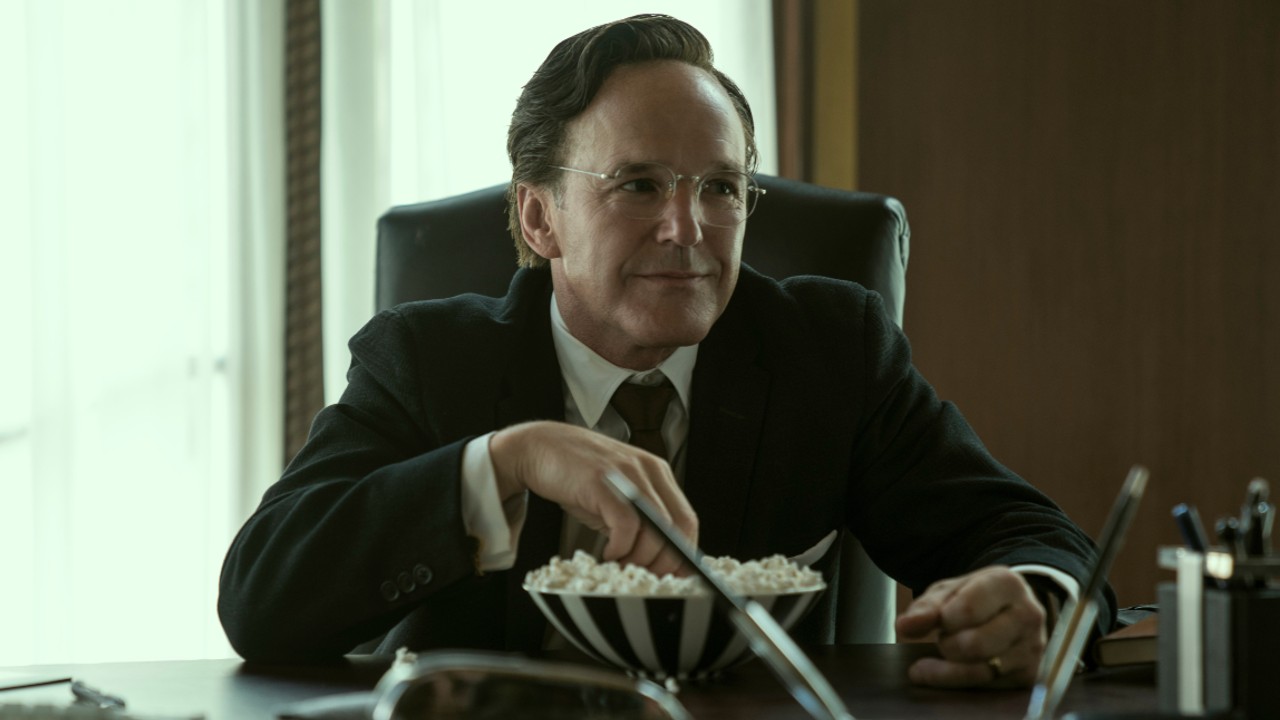
Spoilers for Netflix’s Painkiller are ahead. You can stream the series that just premiered on the 2023 TV schedule with a Netflix subscription.
The OxyContin crisis and opioid epidemic is was not started by one person and it's not a singular issue, and in Painkiller that is made very clear. There are flashbacks that show the beginnings of Purdue Pharma and its founder Arthur Sackler, played by Clark Gregg. However, the greater toxic relationship between the drugs and marketing is shown through this character appearing as a ghost-like spirit in the primary antagonist’s, Matthew Broderick’s Richard Sackler, imagination as he creates and sells the drug. It’s a fascinating creative decision, and the producers told CinemaBlend all about why they made it, and how it helps illuminate just how long these problems have existed.
Throughout the show, Gregg’s character is seen talking to his nephew, Broderick's Richard, about why it’s important to keep selling and pushing the drug. This created a link from Purdue’s founder, Arthur Sackler, to the man who led the charge to sell OxyContin, Richard Sackler. Eric Newman, an executive producer of Painkiller, explained why they decided to have the two characters interact this way, rather than relying on devices like flashbacks. He told CinemaBlend:
Clark is a friend of mine, he’s a great actor, and he's always top of mind creatively for the right part. So much of what Purdue Pharma and Richard Sackler accomplished had its roots in a practice that was perhaps not invented, but certainly furthered and perhaps even perfected by Arthur Sackler, which was this union, incredibly dangerous union in retrospect, between marketing and drugs. And Sackler, Arthur Sackler was very much at the forefront of that.
It’s important to note that Arthur Sackler didn’t live to see the creation of OxyContin, he died in 1987 and the drug was developed and patented in 1996. However, his legacy certainly impacted its creation. Newman elaborated on this idea, saying:
He did not live to see OxyContin; he died some 10 years before it became a thing. But we were making a very clear distinction, as Barry does in his book, between this practice, the ideology behind the pharmaceutical industrial complex, and this tragedy. It is very much the worst-case scenario that comes out of a fundamental irresponsibility of ‘Let's just get this out there and move it.’

Newman went on to explain that bringing in Gregg to play Richard Sackler’s uncle in the form of a ghost-like spirit was a way of showing that Painkiller tells a story that shows “what’s wrong with a lot of the business.” He continued to explain this idea, and how it’s portrayed through Gregg’s character, saying:
So having that perspective play out in I think what became a very inventive way, it just helped us get our point across. This is not just you know, some manifestation of ‘80s greed. You know, it's much bigger than that.
This mode of storytelling is one of the major ways Painkiller fictionalized the real story.
Like all shows based on a true story, this book-to-screen adaptation featured disclaimers, but they were read by families impacted by OxyContin addiction. Both this mode of showing people the real-life implications of this issue, and the fictionalized story between Arthur and Richard can help viewers see what Purdue Pharma did has spanned across generations. Barry Meier, the author of the book Painkiller is partially based on and a consulting producer on the show, spoke to this idea, and how dramatizing this element of the story actually really helped. He said:
As a journalist, I couldn't keep Arthur Sackler alive after he died. I mean I wish I could have been able to do that. But, as script writers, Micah Fitzerman-Blue and Noah Harpster could, and as creators, Pete Berg and Eric could. I think that in the show, Arthur and Arthur's spirit kind of opens up the mind of Richard Sackler and who he is, and what drives a character like him to the levels of self-delusion that Matthew Broderick reaches during the show.
Both Clark Gregg and Matthew Broderick portray two real men who were responsible for the rise of OxyContin and the terrible crisis that followed. Gregg playing Aurther as a sort of ghost to Broderick’s Richard really helped hammer that point home, and truly showed that this issue, that’s still going on today, spans across generations.







